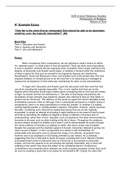Essay
OCR A-level RS: Philosophy - Nature of God: A* Essay - “How fair is the claim that an omnipotent God should be able to do absolutely anything, even the logically impossible?” (40)
- Institution
- OCR
Discusses the nature of God regarding His omnipotence surrounding what is logically possible. I argue against the statement, instead arguing for Vardy and Macquarie's "Self-Imposed Limitation" approach. I include 3 paragraphs: Para 1: Descartes and Anselm Para 2: Aquinas and Swinburne Para 3: Va...
[Show more]



